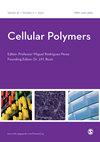一种高效环保的液化生物基多元醇:液化温度和催化剂浓度的优化及其在硬质聚氨酯泡沫中的应用
IF 1.3
4区 医学
Q4 MATERIALS SCIENCE, BIOMATERIALS
引用次数: 2
摘要
为了解决水稻秸秆的液化积累问题,并为保护自然资源和环境提供一条技术可行的途径,对水稻秸秆进行了化学液化。以蓖麻油和蓖麻油为解聚剂,对甲苯磺酸为催化剂,将稻草液化成生物基多元醇。通过化学和分析技术对液化产物进行了表征。通过使用2%的催化剂浓度和180°C的优化温度,农业废弃物基稻草最终转化为聚合物前体(多元醇)单体,产率接近80-95%。合成的多元醇可进一步用于配制高质量的硬质聚氨酯泡沫。从物理、机械、热学和形态等方面对泡沫进行了表征。所有泡沫都表现出良好的压缩强度和热稳定性。泡沫的热导率在0.012和0.023 Kcal/mh°C之间变化,其中液化(LP)的泡沫热导率最低,因此适合用作隔热材料。本文章由计算机程序翻译,如有差异,请以英文原文为准。
An efficient and environment friendly bio-based polyols through liquefaction: Liquefaction temperature and catalyst concentration optimization and utilized for rigid polyurethane foams
Aiming towards the liquefaction of paddy straw was accumulation as well as providing a technically viable route leading to preservation of the natural resources and environment, the paddy straw was chemically liquefied. Paddy straw were liquefied into bio-based polyol in the presence of castor oil and blend of castor and karanja oil as depolymerizing agent and P-Toluene sulfonic acid as catalyst. Liquefied product was characterized by chemical as well as analytical techniques. The agricultural waste base paddy straw was eventually converted into polymeric precursor (polyol) monomer with nearly 80 to 95% yield by employing 2% catalyst concentration and at optimized temperature of 180°C. Synthesized polyol can be utilized further in formulating high quality rigid polyurethane foams. The foams were characterized in terms of their physical, mechanical, thermal and morphological properties. All foams exhibit good compressive strengths and thermal stability. Thermal conductivity of foams varied between 0.012 and 0.023 Kcal/mh°C, with the lowest being of foam from liquefied (LP), making it suitable for utilization as an insulation material.
求助全文
通过发布文献求助,成功后即可免费获取论文全文。
去求助
来源期刊

Cellular Polymers
工程技术-材料科学:生物材料
CiteScore
3.10
自引率
0.00%
发文量
9
审稿时长
3 months
期刊介绍:
Cellular Polymers is concerned primarily with the science of foamed materials, the technology and state of the art for processing and fabricating, the engineering techniques and principles of the machines used to produce them economically, and their applications in varied and wide ranging uses where they are making an increasingly valuable contribution.
Potential problems for the industry are also covered, including fire performance of materials, CFC-replacement technology, recycling and environmental legislation. Reviews of technical and commercial advances in the manufacturing and application technologies are also included.
Cellular Polymers covers these and other related topics and also pays particular attention to the ways in which the science and technology of cellular polymers is being developed throughout the world.
 求助内容:
求助内容: 应助结果提醒方式:
应助结果提醒方式:


